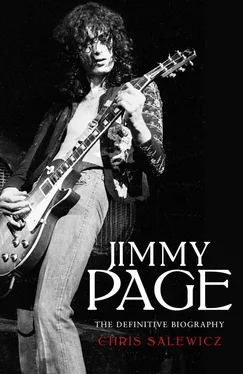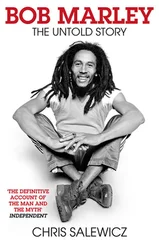1 ...8 9 10 12 13 14 ...30 There was another guitar player on the scene at the time, a callow youth nicknamed Plimsolls, on account of his footwear. Although at first Plimsolls could hardly play at all, he was known to have a reasonably moneyed background that enabled him to own a new Kay guitar. He had another sobriquet, Eric the Mod, a reflection of his stylish dress sense, and he would shortly enjoy greater success when, rather like his idol Robert Johnson, he seemed to suddenly master his instrument, and he reverted to his full name: Eric Clapton.
Page recalled that one night after he had sat in with the R&B All-Stars, ‘Eric came up and said he’d seen some of the sets we’d done and told me, “You play like Matt Murphy,” Memphis Slim’s guitarist, and I said I really liked Matt Murphy and actually he was one of the ones that I’d followed quite heavily.’
Eric Clapton was not the only one to note Page’s expertise. Soon came an approach from John Gibb of the Silhouettes, a group from Mitcham, on the furthest extremes of south London. Gibb asked Page to help record some singles for EMI, starting off with a tune called ‘The Worryin’ Kind’.
The Silhouettes would later occasionally feature Page’s new friend Jeff Beck on guitar. What has always been a fascinating psychogeographical truth is that Jimmy Page, Eric Clapton and Jeff Beck, Britain’s greatest and most creative rock guitarists of the 1960s, grew up within a radius of about 12 miles of each other.
Having witnessed Page’s guitar skills with the R&B All-Stars at the Marquee Club, Mike Leander, a young arranger and producer, pulled him into a studio for a stint as rhythm guitarist in late 1962. Page was moonlighting from art school – something that would become a pattern.
Leander had been alerted to go and check out Page by Glyn Johns, another Epsom boy, a couple of years older than Page who had watched him play years before and was now a tape operator. Of that first meeting, years before, Johns said: ‘One evening we had a talent night. I remember a boy in his early teens no one had seen before, who sat with his legs swinging over the front edge of the stage and played an acoustic guitar. He was pretty good, he may have even won, but I don’t think anyone in the hall that night had any idea that he was to become such an innovative force in modern music.’
‘I was really surprised,’ Page told Beat Instrumental magazine in 1965 about Leander asking him to play. ‘Before that I thought session work was a “closed shop”.
‘Mike was an independent producer then. And he wanted me to play on “Your Momma’s Out of Town” by the Carter-Lewis group. The record was released and I believe it helped him considerably in joining Decca full time.’
Soon Mike Leander had another, more prestigious session gig for Page. This studio date was with Shadows expatriates Jet Harris, a bass player, and drummer Tony Meehan. The resulting tune, ‘Diamonds’, was a number one smash, the first of a run of hits for the duo. Later, Harris and Meehan hired one John Baldwin to accompany their act on the road. Already there were glimmers of some kind of destiny at work; soon John Baldwin would metamorphose into John Paul Jones, so renamed for a solo single by Rolling Stones manager Andrew Loog Oldham; Baldwin’s new moniker was derived from the film John Paul Jones , a popular 1959 movie about the famed US naval commander.
Even though Harris and Meehan had departed the Shadows, it was a huge honour for the 18-year-old Page to play with the alumni of the group that, prior to the Beatles, was the biggest in the UK, largely due to the skill and charisma of Hank Marvin, their bespectacled guitarist.
‘When did I first discover Hank Marvin? When I was about 14, because in those days it was really skiffle for young kids who wanted to learn three chords and have a good time,’ Page told John Sugar on BBC Radio 4 in 2011. ‘But going past that, more into the world of the American rockabilly and rock ’n’ roll was starting to seduce us all as kids. Then you had Cliff Richard and the Drifters [as the Shadows were first known] at that time, putting forward a really, really damned good rendition of it, but it still had that sort of grit identity to it.
‘So really it was a question of seeing Hank playing with Cliff as a kid, looking at Hank on the television. He was good, but he came alive with the Shadows. I mean it was such a really, really good band and Hank was such a stylist … I mean, he was so cool. He was and still is. He had this image … He was such a fluent player … In those early years, all of us – Jeff Beck, myself, Eric Clapton – we all played things like “Apache”, “Man of Mystery”, “F.B.I.”, those sort of [Shadows] hits …
‘Hank managed to come up with this unique sound, and that sound is just so recognisable. He inspired so many guitarists in those days as kids, kids who had no idea they may even be rock stars themselves one day.’
Playing guitar with Jet Harris and Tony Meehan on live dates, along with John Baldwin, was one John McLaughlin, who had given Page some guitar lessons when McLaughlin was working in a guitar shop. ‘I would say he was the best jazz guitarist in England then, in the traditional mode of Johnny Smith and Tal Farlow,’ said Page. ‘He certainly taught me a lot about chord progressions and things like that. He was so fluent and so far ahead, way out there, and I learned a hell of a lot.’
The ‘Diamonds’ session kick-started a new career for Page, one in which he would play up to ten sessions a week, although he was still officially at Sutton Art College. For the next three and a half years, again while officially still a student, he became one of the UK’s top two guitar session players: the other was Big Jim Sullivan, and for a time the boy from Epsom, where he continued to live at his parents’ house, became known as ‘Little Jim’. Working with all manner of artists and styles, he honed his guitar playing during this period. In his early sessions he largely used a black Les Paul Custom he had played with Neil Christian. Known as ‘the fretless wonder’, and with a trio of pickups, it gave Page great tonal flexibility. When required, he also used a 1937 Cromwell archtop acoustic guitar and a Burns amplifier, or from time to time a Fender Telecaster.
In June 1963 Page was interviewed on Channel Television, ITV’s smallest franchise, broadcasting only to the 60,000 inhabitants of the Channel Islands. With his hair immaculately swept back, Page certainly looked the rocking part, yet his accent and precise, formal speech constructions suggested someone from a rather more middle-class background than his actually was. Noted for the duty-free alcohol and tobacco on offer in this UK tax haven, Jersey and Guernsey enjoyed a certain hip cachet as a holiday location: was that why Page was there?
The interview was filmed on an outdoor quayside. The first question was the set-up:
What is a session guitarist?
‘A guitarist who’s brought in to make records, not necessarily doing one-night stands, hoping they’ll get into the hit parade – only getting an ordinary fee.’
He doesn’t work for any particular singer all the time?
‘Not necessarily.’
I gather there are only a few young session guitarists like yourself: why is that?
‘Well, it seems to be quite a closed shop. The Musicians’ Union have their own chaps in and they don’t really like to get the young people in because the old boys need the work.’
So how did you become a session guitarist?
‘I don’t know. Perhaps it was because I had the feel for it.’
How long have you been playing the guitar?
‘Four years.’
Have you always been a session guitarist?
Читать дальше












